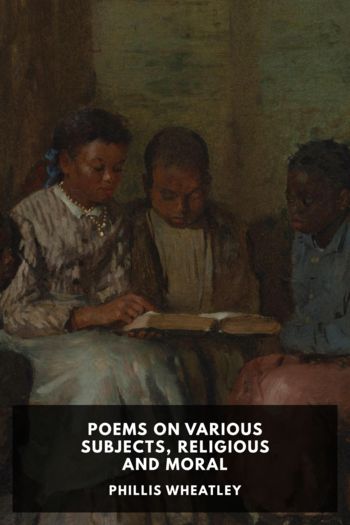The Autobiography of Benjamin Franklin - Benjamin Franklin (pocket ebook reader .txt) 📗

- Author: Benjamin Franklin
Book online «The Autobiography of Benjamin Franklin - Benjamin Franklin (pocket ebook reader .txt) 📗». Author Benjamin Franklin
He smiled at my ignorance, and replied, “These savages may, indeed, be a formidable enemy to your raw American militia, but upon the king’s regular and disciplined troops, sir, it is impossible they should make any impression.” I was conscious of an impropriety in my disputing with a military man in matters of his profession, and said no more. The enemy, however, did not take the advantage of his army which I apprehended its long line of march exposed it to, but let it advance without interruption till within nine miles of the place; and then, when more in a body (for it had just passed a river, where the front had halted till all were come over), and in a more open part of the woods than any it had passed, attacked its advanced guard by heavy fire from behind trees and bushes, which was the first intelligence the general had of an enemy’s being near him. This guard being disordered, the general hurried the troops up to their assistance, which was done in great confusion, through wagons, baggage, and cattle; and presently the fire came upon their flank: the officers, being on horseback, were more easily distinguished, picked out as marks, and fell very fast; and the soldiers were crowded together in a huddle, having or hearing no orders, and standing to be shot at till two-thirds of them were killed; and then, being seized with a panic, the whole fled with precipitation.
The wagoners took each a horse out of his team and scampered; their example was immediately followed by others; so that all the wagons, provisions, artillery, and stores were left to the enemy. The general, being wounded, was brought off with difficulty; his secretary, Mr. Shirley, was killed by his side; and out of eighty-six officers, sixty-three were killed or wounded, and seven hundred and fourteen men killed out of eleven hundred. These eleven hundred had been picked men from the whole army; the rest had been left behind with Colonel Dunbar, who was to follow with the heavier part of the stores, provisions, and baggage. The flyers, not being pursued, arrived at Dunbar’s camp, and the panic they brought with them instantly seized him and all his people; and, though he had now above one thousand men, and the enemy who had beaten Braddock did not at most exceed four hundred Indians and French together, instead of proceeding, and endeavouring to recover some of the lost honour, he ordered all the stores, ammunition, etc., to be destroyed, that he might have more horses to assist his flight towards the settlements, and less lumber to remove. He was there met with requests from the governors of Virginia, Maryland, and Pennsylvania, that he would post his troops on the frontier, so as to afford some protection to the inhabitants; but he continued his hasty march through all the country, not thinking himself safe till he arrived at Philadelphia, where the inhabitants could protect him. This whole transaction gave us Americans the first suspicion that our exalted ideas of the prowess of British regulars had not been well founded.99
In their first march, too, from their landing till they got beyond the settlements, they had plundered and stripped the inhabitants, totally ruining some poor families, besides insulting, abusing, and confining the people if they remonstrated. This was enough to put us out of conceit of such defenders, if we had really wanted any. How different was the conduct of our French friends in 1781, who, during a march through the most inhabited part of our country from Rhode Island to Virginia, near seven hundred miles, occasioned not the smallest complaint for the loss of a pig, a chicken, or even an apple.
Captain Orme, who was one of the general’s aids-de-camp, and, being grievously wounded, was brought off with him, and continued with him to his death, which happened in a few days, told me that he was totally silent all the first day, and at night only said, “Who would have thought it?” That he was silent again the following day, saying only at last, “We shall better know how to deal with them another time”; and died in a few minutes after.
The secretary’s papers, with all the general’s orders, instructions, and correspondence, falling into the enemy’s hands, they selected and translated into French a number of the articles, which they printed, to prove the hostile intentions of the British court before the declaration of war. Among these I saw some letters of the general to the ministry, speaking highly of the great service I had rendered the army, and recommending me to their notice. David Hume,100 too, who was some years after secretary to Lord Hertford, when minister in France, and afterward to General Conway, when secretary of state, told me he had seen among the papers in that office, letters from Braddock highly recommending me. But, the expedition having been unfortunate, my service, it seems, was not thought of much value, for those recommendations were never of any use to me.
As to rewards from himself, I asked only one, which was, that he would give orders to his officers not to enlist any more of our bought servants, and that he would discharge such as had been already enlisted. This he readily granted, and several were accordingly returned to their masters, on my application. Dunbar, when the command devolved on him, was not so generous. He being at Philadelphia, on his retreat, or rather flight, I applied to him for the discharge of the servants of three poor farmers of Lancaster county that





Comments (0)